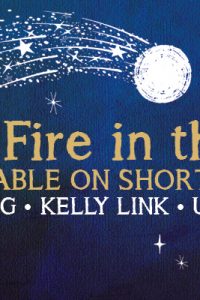William Gibson: One Tough Zeitgeist

William Gibson was born March 17, 1948 in Conway SC and grew up in Virginia, attending boarding school in Arizona. He went to Canada in 1967 to avoid being drafted into the Vietnam War, eventually settling in Vancouver, British Columbia in 1972. He began seriously writing fiction while studying at the University of British Columbia, where he earned a BA in English in 1977. That same year he published his first SF story “Fragments of a Hologram Rose” in Unearth.
Stories including “New Rose Hotel” (1981) and Nebula Award finalists “Johnny Mnemonic” (1981) and “Burning Chrome” (1982) – where he coined the term “cyberspace” – followed, precursors to his famed first novel Neuromancer (1984), winner of the Hugo, Nebula, Philip K. Dick, Seiun, and Ditmar Awards. The novel was a major work of cyberpunk, the genre that largely defined Gibson’s early career. Sequels Count Zero (1986) and Mona Lisa Overdrive (1988) finished the Sprawl trilogy, and both were Hugo and Nebula Award finalists, with Mona Lisa Overdrive winning the Aurora Award. Gibson’s early stories were collected in Burning Chrome (1986). Later stories “Dogfight” (1985, with Michael Swanwick) and “The Winter Market” (1985) were both Hugo and Nebula Award finalists.
Gibson’s work took a new direction with Arthur C. Clarke Award finalist Pattern Recognition (2003), the first of the Bigend or Blue Ant series of novels that can be described as “science fiction about the very recent past.” Sequels Spook Country (2007) and Campbell Memorial Award finalist Zero History (2010) followed.
The Peripheral (2014) was set partly in the near future and partly in the farther future, exploring the idea of time travel where only information, not people or objects, could be sent back, spawning new timelines in the process. A sequel, Agency, is forthcoming in early 2020.
In 2008 Gibson was inducted into the Science Fiction Hall of Fame, and this year he was named a Damon Knight Memorial Grand Master by SFWA. He lives in Vancouver with his wife Deborah Jean Thompson, married in 1972. They have a son and a daughter.
Excerpts from the interview:
“I could see the near future from The Peripheral while driving through the little village of Topanga yesterday – I thought, ‘Ooh, it’s Flynneville.’ Flynneville on the coast. That future in The Peripheral owes a lot to my formative years in quite a small town in southwestern Virginia, adjacent to the bottom of West Virginia and to Tennessee. There’s a lot of childhood material in that thread for me. I’ve also kept track of the region over the decades, and I just extrapolated what’s happened there, like what’s happened to so many small American towns. It’s not just in the South, but there’s a lot of it there. It’s that dissonance between certain kinds of technology being present in places that haven’t moved forward in other ways. There are people in tiny, obscure places who know more about some particular kind of Chinese porcelain than most people in New York do. It’s like any knowledge is unevenly distributed now. You can have these complete otakus in some arcane field of collecting who live in a tiny town in Nebraska, and maybe have never left it, but they still wind up being the world amateur authority on some particular thing.
“I would long for the city if I lived in those places. I’m, if nothing else, grateful every day for not being in the place where I grew up. We live in Vancouver, but we’re in what I think is the last of the streetcar suburbs – we have very few, compared to LA. Beyond that it’s urban sprawl to the horizon.
“Agency uses the same model of time travel as The Peripheral. It’s not my model – I stole it from a story by Lewis Shiner & Bruce Sterling called ‘Mozart in Mirrorshades’. In their story, the time travelers from the future are third-worlding various pasts. When they arrive in 18th-century Germany, they start strip-mining the place and paying everybody off with whatever currency. It’s still a physical time travel model, though. The twist I put on that is that physical time travel isn’t possible, but virtual time travel is. When you digitally contact your own past, however, the butterfly effect happens the minute the person in the past opens the email. They’re no longer part of your past, because that didn’t happen in your past. They’ve caused another timeline just by receiving the message. That’s the split. That split, combined with whatever levels of telepresence are available between the two times, allows you in effect to be there in the new timeline. You could be in a stub, one of these alternate pasts that have been generated this way, in the form of a telepresence robot – one of those little iPads on wheels that rolls around in TED talks so people can attend remotely.
“It’s fuzzy how far back you can go. It’s deliberately unexamined. In The Peripheral, people in the farther future who know more about time travel repeatedly say, ‘You know, we have no idea how this is being accomplished, but there’s a server – somewhere, which we all have an address to – that you can reach that will allow you to contact the past. Once you split a timeline under this – now suddenly very complicated – model, it is no longer your past. You are no longer that past’s future. The new timeline is headed in a specific direction which is unknowable. You can’t know it, and the people in the past can’t know it. Once you contact the past, you establish a one-to-one time ratio, and if you return a week later in your time to that past, exactly a week has passed there as well. I realized after I had worked it all out that what I had actually done was rule out the part of time travel stories that make me a little hinky, where you ask, ‘Why don’t you go back a little further and fix whatever went wrong?’
“Agency is set in 22nd-century London (a few years later in the future timeline from The Peripheral), and in a stub version of 2017 that was generated when someone in that far future was able to digitally connect with 2015. The people in the far-future London know who did it, but he’s dead, and they can’t figure how he reached so far back. It’s the furthest they’ve ever been able to go. It’s a much older stub than the rest, but it’s barely accessible because the telepresence infrastructure wasn’t there. The mystery of how that was possible isn’t solved, but I’m able to set the other thread of the novel in a 2017 stub, which people in the future can sometimes reach, but it’s dodgy – the signal breaks down. The signal improves over the course of the book, so there’s more interaction.
“Agency is actually more like a straight sequel than any second or third book I’ve ever written in my so-called trilogies, which were never planned to be trilogies from the beginning. Those were always another person’s story, set in another part of the same world. Someone from a previous book might be mentioned in passing, but that’s it. Agency is more direct. You don’t necessarily encounter everyone from The Peripheral, but you do encounter some of those people, and you encounter people both from Wilfworld and from Flynneville. It’s sort of a prequel at the same time that it’s a sequel. The people from 2017 have two futures to contend with, so they can see the steps between the two.
“It’s hard to describe the story without spoilers. Part of it was leaked – not by me, but it got out as soon as the publisher heard about it. The 2017 in Agency is one in which the 2016 US presidential election went the other way. Once I decided to try and do that and was sort of running the scenario, I realized that, for the people in that stub, they just don’t believe the other outcome, the course that our history took, was ever possible. To them, it’s not like, ‘Whoah, that was close.’ They don’t wake up every day and go, ‘I’m grateful.’ They’re not very appreciative of the outcome, because as someone from the far future says in the book, they’re still being driven into the same saw, but they’re approaching it at a slightly less acute angle. There are other, bigger factors at play besides who’s president that are going to make them unhappy. You can tell from what the point-of-view character from that stub thinks about the election that once that bizarre possibility is gone, it’s like it could never have happened. That’s how almost everyone I know expected to feel the day after the election, or hoped they would feel. But the people in that stub don’t really get any relief, because there’s something afoot in the Middle East that’s very bad and imminently world-threatening, and so they’re all concentrating on that. They don’t go, ‘Oh, at least Trump’s not in charge of this problem.’ They don’t have Trump, but they still have the biosphere collapsing and things that are actually of greater import. It’s not particularly cheerful in that timeline, and neither are they uniformly appreciative of their president.”
Interview design by Francesca Myman. Photo by Liza Groen Trombi.
Read the full interview in the August 2019 issue of Locus.
 While you are here, please take a moment to support Locus with a one-time or recurring donation. We rely on reader donations to keep the magazine and site going, and would like to keep the site paywall free, but WE NEED YOUR FINANCIAL SUPPORT to continue quality coverage of the science fiction and fantasy field.
While you are here, please take a moment to support Locus with a one-time or recurring donation. We rely on reader donations to keep the magazine and site going, and would like to keep the site paywall free, but WE NEED YOUR FINANCIAL SUPPORT to continue quality coverage of the science fiction and fantasy field.







